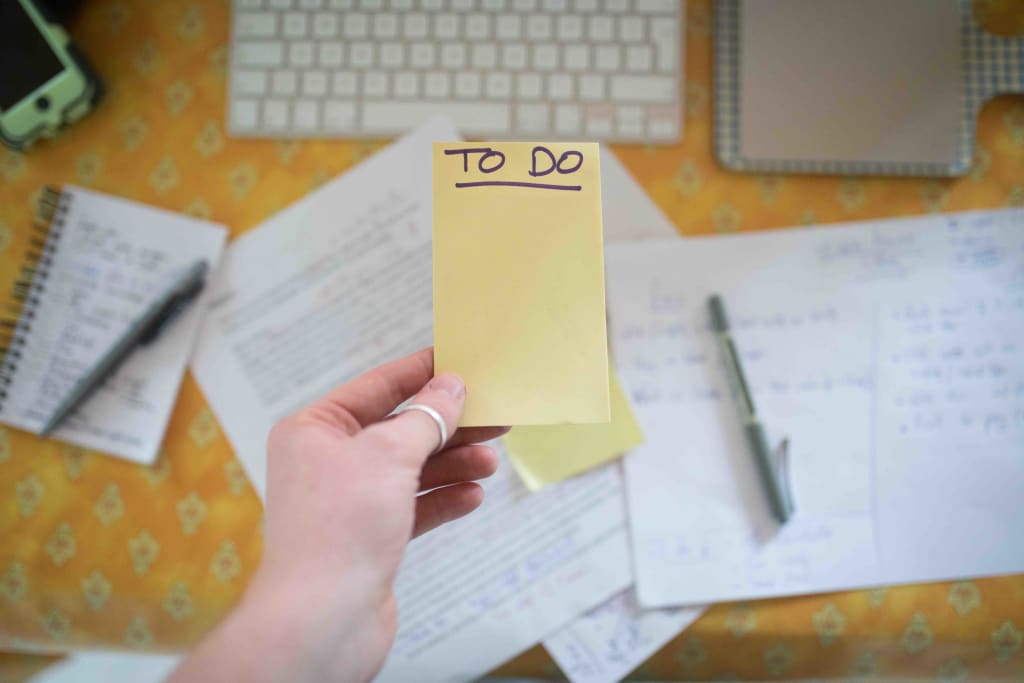How to Help Your Freelance Career
Living the freelance life can be hard, but here are a few steps that I have learnt the hard way through worrying, stressing, and being unproductive.

Imagine not earning a single penny for a whole month, but not classing it as a ‘holiday.’
I've been ‘working’ nearly every single day over the last month but have yet to earn any money. But the definition of "working" according to the Oxford Dictionary online is this: “having paid employment.”
I guess I can’t really say I’m ‘working’ then, so how come it feels like I am? Most days I get up at 8 AM to be ready to work for 9 AM. I grab a shower to re-boot, either make a smoothie for breakfast or a bowl of porridge, and then sit at my desk, plug in music, and work on the ’To Do List’ I scribbled down on a sticky note the night before.
How do I know that I am doing the right thing? Is what’s on my To Do List even useful for where I want to go? Am I just screwing myself over for the future?
It is this kind of worry and stress that I feel most days.
If I had stayed in Cambridge I could be earning, having a monthly income of working a part time job, and earning from creative projects that come up. I would be able to see my friends on a night out every few weeks and be able to have a ‘working’ routine. But no. I decided to move to the West of France with a small amount of money to keep me afloat, with no real plan and not even knowing how to speak the language properly; I’m being serious when I say this, my French is basically limited to saying ‘Yes’, ’No,’ and 'Can I have two croissants please.'
These are all fair worries, but luckily I have discovered them early on and I can figure out and accept that they are here. After accepting and acknowledging these, I can try to justify them so they aren’t as scary as they seem.
Take me worrying about my to do list, for example; is it even useful? My acknowledgment of this worry allows me to go through my to do list one by one and question myself how this may help me in building my career. “Add new images to website” — my time spent on this can help me because I am showing people and possible clients what my potential is. I am showing them what I can do, meaning they won’t just pass my portfolio without even looking through it. This act of said client stopping and looking through my work then allows them to see my style. If they then like my style, they will make contact with me regarding a job they want doing. I then create the work for them, get payed, and can stay afloat.
I do this with every point on my list until every job has a purpose for being there. Points that don’t have a strong enough purpose, like “binge watch that show on Netflix,” I scribble it out and move on; this may help me to relax, but I don’t want to relax at the moment, I need to work.
When a to do comes up but it doesn’t affect my work directly, I have to think of a way how it may help me, so I think back to initially ‘why’ I wrote it in the first place.
“Go for a run,” for example; this won’t exactly help me get clients and therefore money straight away, but it will help me push for this. Going for a run and doing exercise outside will increase my creativity and my health. When being outside, you are open to many more feelings than when stuck in a room staring at a monitor. A gust of wind, the feeling of sand on your feet, the rain hitting your face, sounds of the trees moving, taste of the sea air, or simply just meeting someone new out of the house can bring creativity and give you a fresh mindset. This method of undergoing each step in my to do list will then bring on more contacts, clients, and work.
Key aspects of undergoing this strategy of figuring out these worries: justify each task you undergo, create a rough routine for yourself, relax so it can benefit you and add deadlines to your work. Justifying each task; allows you to have the positive mindset that these steps you are taking are beneficial. Routine: this allows you to dedicate time to work hard and then relax — the worst thing is when you lose track and you find yourself relaxing most of your time. Relaxing: instead of always watching TV programmes or films, maybe read a book, go for a walk, or chop some wood for the fire (only if you have one, of course). This method allows you to take a break from work but still allows yourself to be open to creativity and light working in some way. Reading a book can help with your vocabulary, spelling, creative writing and also can teach you things you may not know.
Deadlines: creating deadlines to your work pushes yourself to get the job done. If you have a deadline you will find that you are more productive and harder working. Even if the work is for yourself and the consequences of not getting it done are near nill, you should create a downside of not getting it done in your head. “If I don’t put these images up on my website by Thursday, clients could have already viewed my site and seen my old work and moved on.”
These steps and methods have helped me restrain the thoughts and worries of my time here not being productive. I am currently going down a route and I have no idea if it will lead anywhere, but I have to keep working hard on what I believe will turn this method into paid work and thus my career.
About the Creator
Toby Roney
I am Toby Roney, a UK based visual creative. I believe that travel can open your eyes for the better. This is why I document my own travels, through stills, film and writing. My aim; inspire people to get out & have their own adventure.






Comments
There are no comments for this story
Be the first to respond and start the conversation.